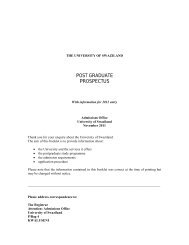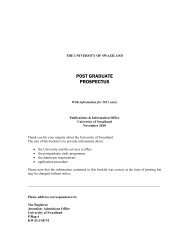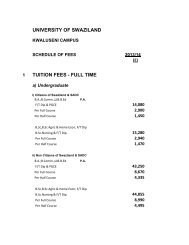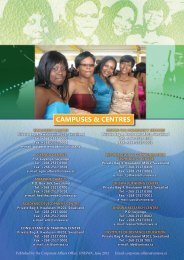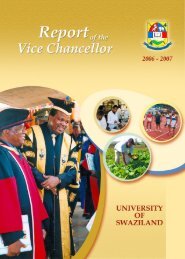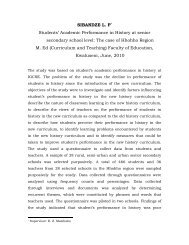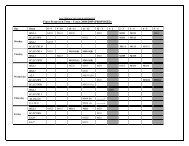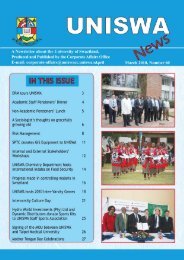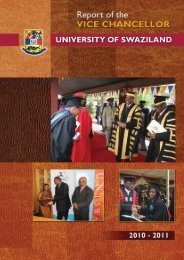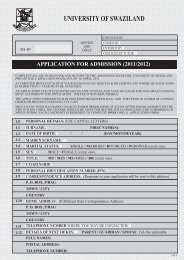UNISWA
October 2013 - University of Swaziland
October 2013 - University of Swaziland
- No tags were found...
You also want an ePaper? Increase the reach of your titles
YUMPU automatically turns print PDFs into web optimized ePapers that Google loves.
THE UNIVERSITY OF SWAZILAND, THROUGH ITS MESA CHAIR, HOSTEDTHE SARUA CLIMATE CHANGE CAPACITY BUILDING WORKSHOPBy Mr. Mandla MliphaThe University of Swaziland (<strong>UNISWA</strong>),alongside Universities of Botswana (UB) andZambia (UNZA), was accorded the SADCMESA Chair which was accompanied by seed fundingto support environment and sustainability activities at<strong>UNISWA</strong>. The MESA chair has supported a numberof activities within and outside <strong>UNISWA</strong> includingMozambique. In its existence, the <strong>UNISWA</strong> MSAChair collaborated with other entities, especiallythe SADC-Regional Environmental EducationProgramme (REEP) to host national and regionalmeetings and workshops.On June 06 -07, 2013 the <strong>UNISWA</strong> MESA Chaircollaborated with HEMA (Higher Education AfricaManagement consortium to host the SARUA (SouthernAfrican Regional Universities Association) mappingworkshop on climate change capacity development.The workshop was within the overall Climate ChangeCounts initiative which is intended to strengtheninguniversities’ contributions to climate compatibledevelopmentin southern Africa.Climate compatible development (CCD) is lowcarbon, climate resilient development. The concepthas been developed in recognition of the urgent needfor adaptation, given current climate variability andthe severity of projected climate impacts that willaffect the region; and the need to reduce emissionsas rapidly as possible to avoid more catastrophicclimate change in the future. Thus while CCD can beframed in different ways, given nationally and locallyspecific development trajectories, it does require thatcurrent and future climate risks are mainstreamed intodevelopment, and that both adaptation and mitigationare integral goals of development.In the southern African context, poverty reductionwould be a desired co-benefit. Uncertainties in majordrivers of change, including climate, socio-economicand political risks, necessitate that CCD be viewed as aniterative process, in which vulnerability identificationand risk reduction responses are revised on the basis ofcontinuing learning. Climate compatible developmentopens up new opportunities for interdisciplinary andtrans-disciplinary research, teaching and engagementwith communities, policy makers and practitioners.The participants were drawn from various climatechange stakeholders including a recognisablerepresentation from <strong>UNISWA</strong> while others were fromthe Swaziland Meteorological services, SwazilandEnvironment Authority, Swaziland ElectricityCompany, Komati Basin Water Authority (KOBWA),UNDP, UNESCO, Swaziland National TrustCommission, Teacher Training Colleges, SouthernAfrican University (SANU) to name but a few (Figure1).The participants were welcome to the workshopand <strong>UNISWA</strong> by the Vice Chancellor, Prof. CiscoMagagula. In his remarks the VC mentioned the maincauses of climate change as activities of human beingsand further estimated the proportions of dangers andvulnerabilities due to climate change hence citedthe seriousness of climate change impacts on humanbeings they will remain unmitigated. He concluded bypaying tribute to SARUA and HEMA for undertakingsuch an important and ambitious programme onclimate change and stressed his personal pleasure that<strong>UNISWA</strong>, as a founder member of SARUA is hostingthis important workshop.The official opening addressed was done by thePrincipal Secretary of the Ministry of Education andTraining, Mr Pat Muir, who was representing theHonourable Minister. Mr Muir started his address bystating his personal pleasure to note that the workshopwas well attended and to see a recognisable number ofteachers among the participants. He urged participantsto make their contributions “without fear or favour”so that the outcome of the workshop helps the wholeworld and ensure the mainstreaming of Climate changein the school curriculum. He concluded his addressby encouraging participants to learn from nationsthat are already ahead in addressing climate changeissues and share of information between sciences andhumanities as well as across disciplines. Facilitationof the workshop was conducted jointly by HEMA’sPenny Urquhart and Botha Kruger as well as the<strong>UNISWA</strong> MESA Chair Coordinator Mandla Mlipha.<strong>UNISWA</strong> News - October 2013 5



